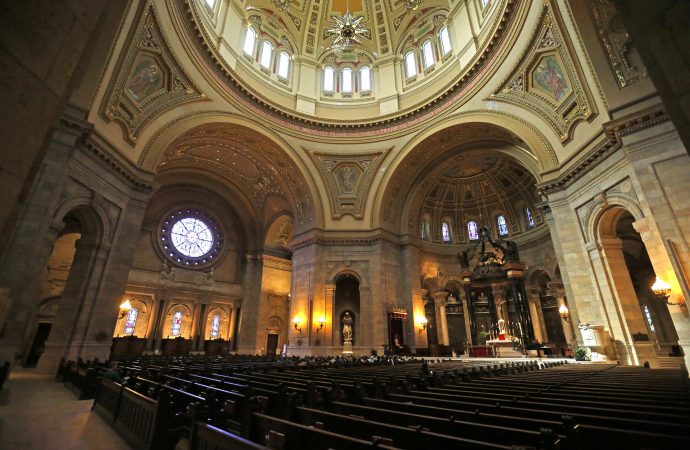Making the Church a Target Won’t Help Abuse Victims
By Christopher White
In this May 3, 2016 photo, the sanctuary of the St. Paul Cathedral is pictured in St. Paul, Minn. It's been nearly three years since Minnesota opened a path for lawsuits by victims of long-ago childhood sexual abuse. The Archdiocese of St. Paul and Minneapolis filed for bankruptcy protection last year, (Credit: AP Photo/Jim Mone) What supporters of legislation to extend the statute of limitations for suing the Church are hailing as “reform” actually threatens the institution that is now the very facilitator of responding to sexual abuse in the United States. If passed, these measures would directly imperil the local schools and parishes that have become the safest places for children in the country. Almost fifteen years after the Boston Globe’s devastating reporting on clerical sexual abuse in the United States, the Church remains under scrutiny for its treatment of minors. Whereas the 2002 coverage exposed cover-up at the highest level of Church authority and provided a spotlight on a much-needed area of reform, today’s headlines should be offering a very different story. Since then, the Church has enacted a zero tolerance policy for sexual abusers, and, if any priest commits a single act of abuse, he is forever removed from his ministry. On June 4, Pope Francis took an important step to take this policy even further when he outlined a plan for the removal of bishops who have been negligent in their handling of abuse cases. In the United States, the Church has instituted mandatory background checks for any individual that works with minors-far surpassing the standards of any public institution. Every diocese in the U.S. has also established Safe Environment programs that are responsible for complying with canon and civil law, along with outside monitoring and oversight. Last month, the United States Conference of Catholic Bishops issued its annual report on the Implementation of the Charter for the Protection of Children and Young People. The report concludes that “over 4.3 million children and 2.4 million adults have been trained to identify the warning signs of abuse and how to report them”-more far-reaching than any other institution, public or private, religious or secular, in both size and scale. Considering these facts and figures, one might reasonably wonder: If the Church in the United States seems to have made such progress-indeed, becoming the gold standard for the protection of minors -then why the recent headlines in Pennsylvania, New York, and elsewhere charging the Church with not wanting to accept responsibility for abuse and to support its victims? On the weekend of June 4th, Archbishop Charles Chaput of Philadelphia issued a letter that was read in all Philadelphia parishes warning Catholics of HB 1947, a Pennsylvania bill that would reverse the civil statute of limitations for sexual abuse in the state. Just days earlier, New York’s Cardinal Timothy Dolan and the New York Catholic Conference were lambasted in the New York papers for opposing similar efforts in New York. Across the country, similar attempts to modify or remove the statute of limitations for victims of sexual abuse are taking place. As Chaput wrote in his letter, “HB 1947 [the Pennsylvania bill] is retroactive for private and religious entities, but not retroactive for public institutions. It places very low caps on damages for sexual abuse in public schools in the future …. Meanwhile, private and religious entities face unlimited liability for exactly the same evil actions, and not just going forward, but also in the past. This is not justice.” In surveying this bill and others like it, one cannot help but to notice its prejudicial nature, where the very institution now responsible for setting the highest standards for dealing with abuse has become targeted in a way that others have not. What supporters of this sort of legislation are hailing as “reform” actually threatens the institution that is now the very facilitator of responding to sexual abuse in the United States. Indeed, if such legislation were passed it would directly imperil the local schools and parishes that have become the safest places for children in the country. As Stephen Jenkins, a Delaware attorney who has surveyed the effects of similar legislation in his state, took to the pages of the Philadelphia Inquirer to warn: “Child sexual abuse is evil, and the abusers deserve to be punished for their terrible crimes. But HB 1947 isn’t going to punish a single abuser. Instead, it will almost certainly result in closed schools and reduced ministries, thus hurting the innocent-particularly children and the poor.” Regrettably, this bill has very little to do with actually holding abusers accountable. The Church has never had a problem with the removal of criminal statute of limitations-and indeed advocates for their removal. When Pope Francis visited Philadelphia this past September, he met with victims of sexual abuse and remarked that “God weeps” for them. Chaput, Dolan, and others have echoed this sentiment, and taken strong actions to stand in solidarity with all who were affected by this grave crisis. Yet on that same trip to the United States, Francis praised the work of the U.S. bishops and all who have responded to the sexual abuse crisis by working hard to ensure that Catholic institutions are the first to set the highest standards of protection and prevention and rightly to seek justice for victims and abusers alike. Justice requires that all of our children be kept safe-and all institutions be held rightly accountable. The efforts of the Catholic Church in the United States in responding to sexual abuse should prove to be an occasion to provide testament to what happens when those in authority seek true reform. Regrettably, some are seizing the moment to make it a target instead.
|
.
Any original material on these pages is copyright © BishopAccountability.org 2004. Reproduce freely with attribution.
